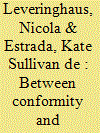| Srl | Item |
| 1 |
ID:
160121


|
|
|
|
|
| Summary/Abstract |
China and India, as rising powers, have been proactive in seeking status as nuclear responsibles. Since the 1990s they have sought to demonstrate conformity with intersubjectively accepted understandings of nuclear responsibility within the global nuclear order, and have also sought recognition on the basis of particularistic practices of nuclear restraint. This article addresses two puzzles. First, nuclear restraint is at the centre of the pursuit of global nuclear order, so why have China and India not received recognition from influential members of the nuclear order for the full spectrum of their restraint-based behaviours? Second, why do China and India nonetheless persist with these behaviours? We argue that the conferral of status as a nuclear responsible is a politicised process shaped by the interests, values, and perceptions of powerful stakeholder states in the global nuclear order. China’s and India’s innovations are not incorporated into the currently accepted set of responsible nuclear behaviours because, indirectly, they pose a strategic, political, and social challenge to these states. However, China’s and India’s innovations are significant as an insight into their identity-projection and preferred social roles as distinctive rising powers, and as a means of introducing new, if nascent, ideas into non-proliferation practice and governance.
|
|
|
|
|
|
|
|
|
|
|
|
|
|
|
|
| 2 |
ID:
184972


|
|
|
|
|
| Summary/Abstract |
In 2005, the United States recognized India as a ‘responsible state with advanced nuclear technology’. How did India go from pariah to a legitimate nuclear state? This article historicizes the concept of nuclear responsibility to explain India's shifting place in the nuclear regime. Existing perspectives view responsibility as a function of discrete state behaviors to the detriment of understanding the relationship between power and responsibility as a discourse. This article tracks the evolving discourse of early proliferators, such as the US, UK and France, who legitimated their possession of nuclear weapons by linking responsibility with deterrence. In its early nuclear history, India challenged these hegemonic perspectives but more recently adopted the deterrence model of responsibility to be granted recognition and legitimacy in the global nuclear regime. The article concludes that nuclear states’ success in linking deterrence with responsibility complicates the place of disarmament as an alternative nuclear responsibility discourse. Tying deterrence to responsibility reshaped the global order around the continual presence of nuclear weapons, narrowing moral agency and limiting a nuclear weapon-free future. Reclaiming responsibility will require moving beyond the typical state-centric politics of blame towards institutional and structural approaches to moral agency.
|
|
|
|
|
|
|
|
|
|
|
|
|
|
|
|